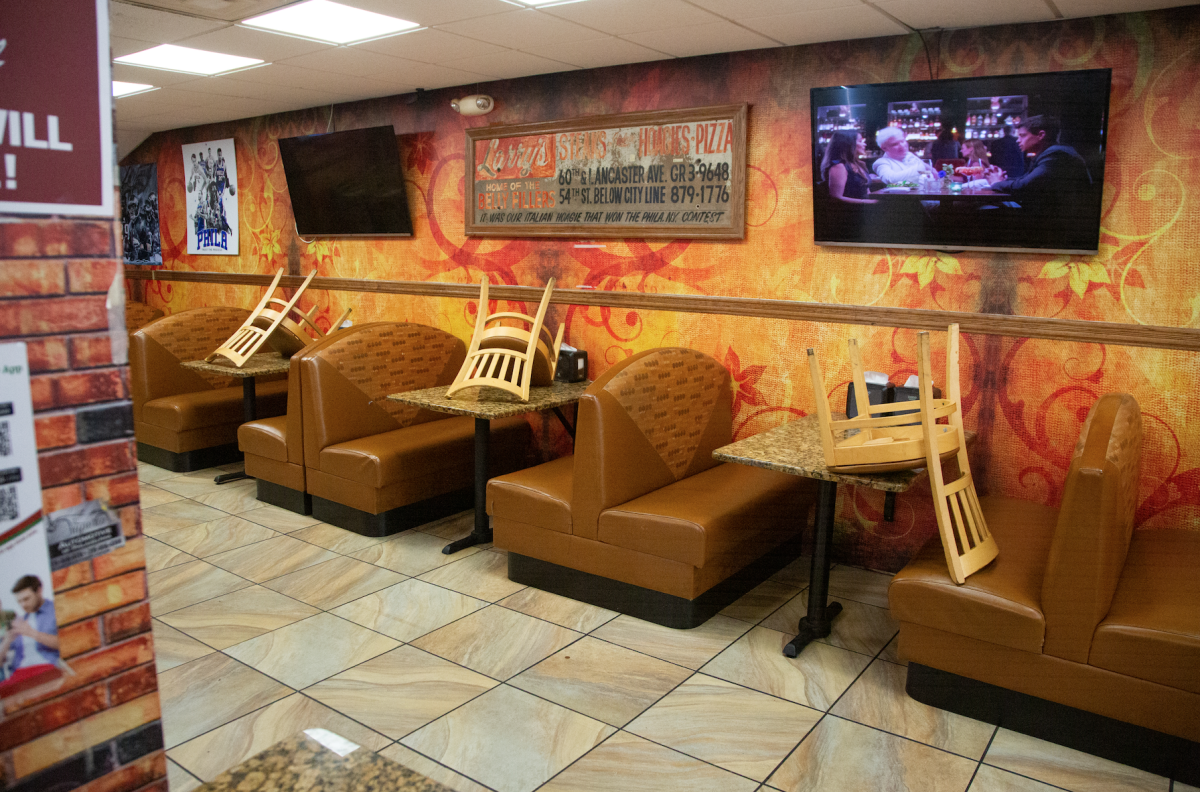Albin Bailey, general manager of Landmark Americana, the bar and restaurant located on 54th Street across from Michael J. Hagan ’85 Arena, had to send his staff home at 5 p.m. on March 16 following an order from Gov. Tom Wolf to shut down non-essential businesses through at least March 27 due to the coronavirus.
Bailey estimated that on March 17, the day after Gov. Wolf’s order went into effect, Landmark had just $260 in sales. Now, Bailey said is implementing more specials to encourage customers to order takeout at an establishment that is traditionally dine-in.

“It stinks being a small business owner,” Bailey said. “I feel bad for my staff. I have employees that are single parents and it’s going to affect them drastically. They’ll have to figure out how to feed their families.”
The challenge for locally owned eateries along the borders of St. Joe’s campus is twofold: food establishments cannot allow customers to dine in and are therefore limited to delivery and pick-up only. Restaurants located along 54th and City Avenue and the 63rd Street corridor across from Pennbrook Apartments will also miss business from students whose classes will be taught remotely through at least April 9.
The university has encouraged students to return to their permanent home residences but are permitted to remain in their residence halls under certain circumstances. Most students have been off campus since spring break, March 9-13.

Jimmy Lambritsios, manager at Overbrook Pizza located on 63rd Street, said he is already seeing a decrease in traffic, though his establishment is normally takeout only.
“On the weekends when the cafeteria is closed, [we] see a percentage of kids coming on Saturday and Sunday,” Lambritsios said. “If you’re a freshman and your meal ticket is not there, you have to go and support one of your local businesses. Now, they’re away. It’s going to hurt. Not just me, everybody.”
Between 20% and 30% of Overbrook Pizza’s business comes from college students, Lambritsios estimates. Tony Elebah, owner of Larry’s Steaks located across from Hagan Arena, gave a similar figure, estimating that, “at least 30%” of their business comes from St. Joe’s students, though the cheesesteak shop is patronized by local residents as well.
Customers can normally order at the counter at Larry’s Steaks and stay to eat in their dining area if they wish. Elebah said his shop opted to move to takeout only on March 14, two days before Gov. Wolf announced his imposed restrictions.

Elebah said business has been “slow” this past week between students not being on campus and people taking precautions due to the coronavirus, but customers are still coming in.
“We’ll see if we have to close, but even if we close, how will people eat?” Elebah said. “The way they say it, go buy food from the supermarket. After a while, everything’s going to stop being supplied. Even if you have the food, people get tired of it.”
Bill’s Market, owned by Kimey Moon and her husband Bill, is located next to Overbrook Pizza. Moon’s store is frequented by students who live on what the Office of Residence Life calls West Campus, positioned about a mile south of Main Campus on City Avenue.

The establishment, fondly referred to by many as “Kimey’s,” serves as a market with snacks, frozen foods and essential items as well as a takeout counter boasting a full menu cooked by Moon herself.
Moon estimates she’s already experienced a 50% cut in sales due to the absence of students in the area.
“It’s terrible,” Moon said of the effect the coronavirus has had on her business. “What are we going to do? We can’t do anything, just keep it clean. Protection is my part of the job.”
According to the U.S. Department of Agriculture (USDA), there is currently no evidence suggesting that the coronavirus can be transmitted by food or food packaging, though those handling or preparing foods should follow proper hygiene practices.
Al-Sham Restaurant, an establishment whose menu consists primarily of Middle Eastern fare, is positioned diagonally from Lannon Apartments. Owner Istiyaak Kahn echoed Moon’s sentiment of prioritizing safety.
“We’re doing whatever we can,” Kahn said. “We’re not trying to lock the store down, but we’re doing whatever we can to be safe, to keep our customers and our employees safe.”
Al-Sham will continue to serve customers with pick-up orders as well as delivery through third-party delivery services like Uber Eats, which is currently waiving delivery fees and encouraging users to order from local establishments, according to the company’s March 16 press release.
When non-essential businesses were ordered to close, Philadelphia Mayor Jim Kenney announced that The City, along with Philadelphia’s public-private economic development corporation (PIDC), will launch a program to support local businesses, help maintain payroll obligations and preserve jobs impacted by the coronavirus. In a press conference, Kenney said the program will include a mix of new grants and zero interest loans for local businesses that make under $5,000,000 in annual revenue, in addition to PIDC’s existing lending programs.
According to Kenney, more details about the program and how businesses can apply will be announced in the following days. Business owners who have questions are encouraged to contact the Commerce Department’s Office of Business Services.
“The restrictions we announced yesterday are difficult but necessary, and I can tell you that the great majority of folks have been understanding and cooperative,” Kenney said in a March 17 press conference. “We are working very hard to balance the importance of vital health precautions with the desire to continue life, including business activity, as much as possible.
Still, for local business owners, the foreseeable future is uncertain.
“How long is it going to take?” Elebah said. “Only God knows.”












































